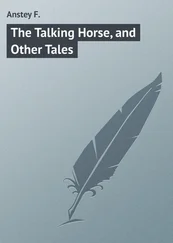* * *
“Are you ill at ease?” she asked again.
Then, like a man who pronounces his own doom, I answered in a low voice: “Yes, I am ill at ease for love of you.” And as she did not stir nor answer, the same power moved my lips in spite of me and I said, “I, who am unworthy of the lightest of your thoughts, I who abuse hospitality and repay your gentle courtesy with bold presumption, I love you.”
She leaned her head upon her hands, and answered softly, “I love you. Your words are very dear to me. I love you.”
“Then I shall win you.”
“Win me,” she replied.
But all the time I had been sitting silent, my face turned toward her. She, also silent, her sweet face resting on her upturned palm, sat facing me, and as her eyes looked into mine I knew that neither she nor I had spoken human speech; but I knew that her soul had answered mine, and I drew myself up feeling youth and joyous love coursing through every vein. She, with a bright colour in her lovely face, seemed as one awakened from a dream, and her eyes sought mine with a questioning glance which made me tremble with delight. We broke our fast, speaking of ourselves. I told her my name and she told me hers, the Demoiselle Jeanne d’Ys.
She spoke of her father and mother’s death, and how the nineteen of her years had been passed in the little fortified farm alone with her nurse Pelagie, Glemarec René the piqueur, and the four falconers, Raoul, Gaston, Hastur, and the Sieur Piriou Louis, who had served her father. She had never been outside the moorland—never even had seen a human soul before, except the falconers and Pelagie. She did not know how she had heard of Kerselec; perhaps the falconers had spoken of it. She knew the legends of Loup Garou and Jeanne la Flamme from her nurse Pelagie. She embroidered and spun flax. Her hawks and hounds were her only distraction. When she had met me there on the moor she had been so frightened that she almost dropped at the sound of my voice. She had, it was true, seen ships at sea from the cliffs, but as far as the eye could reach the moors over which she galloped were destitute of any sign of human life. There was a legend which old Pelagie told, how anybody once lost in the unexplored moorland might never return, because the moors were enchanted. She did not know whether it was true, she never had thought about it until she met me. She did not know whether the falconers had even been outside, or whether they could go if they would. The books in the house which Pelagie, the nurse, had taught her to read were hundreds of years old.
All this she told me with a sweet seriousness seldom seen in any one but children. My own name she found easy to pronounce, and insisted, because my first name was Philip, I must have French blood in me. She did not seem curious to learn anything about the outside world, and I thought perhaps she considered it had forfeited her interest and respect from the stories of her nurse.
We were still sitting at the table, and she was throwing grapes to the small field birds which came fearlessly to our very feet.
I began to speak in a vague way of going, but she would not hear of it, and before I knew it I had promised to stay a week and hunt with hawk and hound in their company. I also obtained permission to come again from Kerselec and visit her after my return.
* * *
“Why,” she said innocently, “I do not know what I should do if you never came back;” and I, knowing that I had no right to awaken her with the sudden shock which the avowal of my own love would bring to her, sat silent, hardly daring to breathe.
“You will come very often?” she asked.
“Very often,” I said.
“Every day?”
“Every day.”
“Oh,” she sighed, “I am very happy. Come and see my hawks.”
She rose and took my hand again with a childlike innocence of possession, and we walked through the garden and fruit trees to a grassy lawn which was bordered by a brook. Over the lawn were scattered fifteen or twenty stumps of trees—partially imbedded in the grass—and upon all of these except two sat falcons. They were attached to the stumps by thongs which were in turn fastened with steel rivets to their legs just above the talons. A little stream of pure spring water flowed in a winding course within easy distance of each perch.
The birds set up a clamour when the girl appeared, but she went from one to another, caressing some, taking others for an instant upon her wrist, or stooping to adjust their jesses.
“Are they not pretty?” she said. “See, here is a falcon-gentil. We call it ‘ignoble,’ because it takes the quarry in direct chase. This is a blue falcon. In falconry we call it ‘noble’ because it rises over the quarry, and wheeling, drops upon it from above. This white bird is a gerfalcon from the north. It is also ‘noble!’ Here is a merlin, and this tiercelet is a falcon-heroner.”
I asked her how she had learned the old language of falconry. She did not remember, but thought her father must have taught it to her when she was very young.
Then she led me away and showed me the young falcons still in the nest. “They are termed niais in falconry,” she explained. “A branchier is the young bird which is just able to leave the nest and hop from branch to branch. A young bird which has not yet moulted is called a sors, and a mué is a hawk which has moulted in captivity. When we catch a wild falcon which has changed its plumage we term it a hagard. Raoul first taught me to dress a falcon. Shall I teach you how it is done?”
She seated herself on the bank of the stream among the falcons and I threw myself at her feet to listen.
Then the Demoiselle d’Ys held up one rosy-tipped finger and began very gravely.
“First one must catch the falcon.”
“I am caught,” I answered.
She laughed very prettily and told me my dressage would perhaps be difficult, as I was noble.
“I am already tamed,” I replied; “jessed and belled.”
She laughed, delighted. “Oh, my brave falcon; then you will return at my call?”
“I am yours,” I answered gravely.
She sat silent for a moment. Then the colour heightened in her cheeks and she held up her finger again, saying, “Listen; I wish to speak of falconry—”
“I listen, Countess Jeanne d’Ys.”
But again she fell into the reverie, and her eyes seemed fixed on something beyond the summer clouds.
“Philip,” she said at last.
“Jeanne,” I whispered.
“That is all,—that is what I wished,” she sighed,—“Philip and Jeanne.”
She held her hand toward me and I touched it with my lips.
“Win me,” she said, but this time it was the body and soul which spoke in unison.
After a while she began again: “Let us speak of falconry.”
“Begin,” I replied; “we have caught the falcon.”
Then Jeanne d’Ys took my hand in both of hers and told me how with infinite patience the young falcon was taught to perch upon the wrist, how little by little it became used to the belled jesses and the chaperon à cornette.
“They must first have a good appetite,” she said; “then little by little I reduce their nourishment; which in falconry we call pât. When, after many nights passed au bloc as these birds are now, I prevail upon the hagard to stay quietly on the wrist, then the bird is ready to be taught to come for its food. I fix the pât to the end of a thong, or leurre, and teach the bird to come to me as soon as I begin to whirl the cord in circles about my head. At first I drop the pât when the falcon comes, and he eats the food on the ground. After a little he will learn to seize the leurre in motion as I whirl it around my head or drag it over the ground. After this it is easy to teach the falcon to strike at game, always remembering to ‘faire courtoisie á l’oiseau’, that is, to allow the bird to taste the quarry.”
Читать дальше












